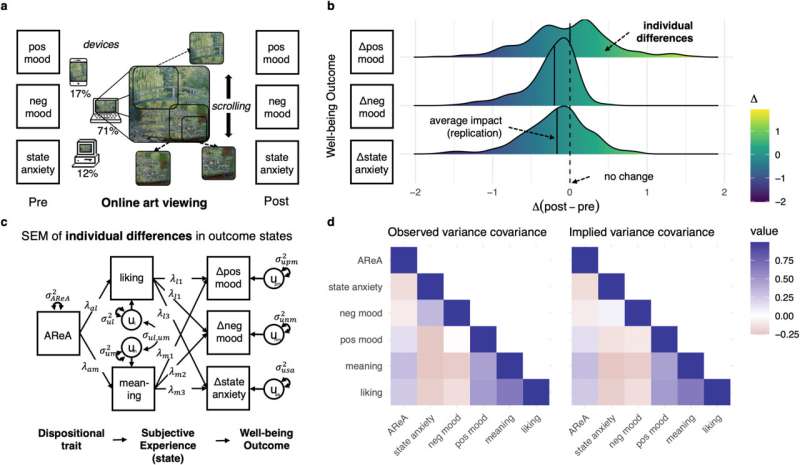This article has been reviewed according to Science X's editorial process and policies. Editors have highlighted the following attributes while ensuring the content's credibility:
fact-checked
peer-reviewed publication
trusted source
proofread
Online art for real-world well-being

A recent study conducted by researchers from the University of Vienna, the Max Planck Institute for Psycholinguistics, and the Max Planck Institute for Empirical Aesthetics sheds light on the potential of online art viewing as a tool for improving well-being.
The study was led by University of Vienna researchers MacKenzie Trupp and Mathew Pelowski and involved 240 participants who viewed an interactive Monet Water Lilies art exhibition from Google Arts and Culture. Results showed significant improvements in mood and anxiety after just a few minutes of viewing, highlighting the positive impact online art viewing can have on mental health.
Interestingly, the study also found that some people are more receptive to art than others and were able to benefit more. This advantage could be predicted using a metric called "aesthetic responsiveness," a personal trait developed by one of the team members. The researchers found that these additional well-being benefits reported by esthetically responsive people were largely driven by meaning-making and pleasure felt during the art viewing.
Overall, this study offers evidence for the potential of online art interventions to have a detectable positive effect on well-being. The results published in Computers in Human Behavior highlight the potential for utilizing the embeddedness of digital art media in users' lives, allowing for bite-size art experiences on demand, ready to shift them from the every day into therapeutic states of pleasure and meaning-making.
First Author Trupp suggests that "this study leads to an excitingly more nuanced understanding of the literature in the field but also emphasizes the need for further empirical investigation of possible mechanisms." Understanding that well-being can be supported without an in-person visit to a physical museum is particularly important as it is not always possible to make such a trip, especially for those in hospitals, care homes, rural towns, or in lockdown.
More information: MacKenzie D. Trupp et al, Who benefits from online art viewing, and how: The role of pleasure, meaningfulness, and trait aesthetic responsiveness in computer-based art interventions for well-being, Computers in Human Behavior (2023). DOI: 10.1016/j.chb.2023.107764



















